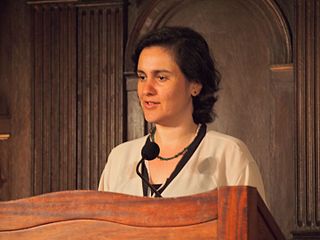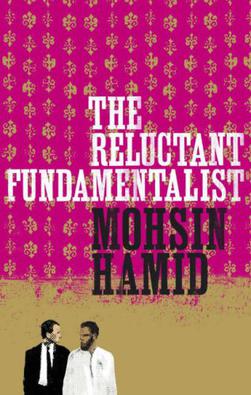The International Dublin Literary Award, established as the International IMPAC Dublin Literary Award in 1996, is presented each year for a novel written or translated into English. It promotes excellence in world literature and is solely sponsored by Dublin City Council, Ireland. At €100,000, the award is one of the richest literary prizes in the world. If the winning book is a translation, the prize is divided between the writer and the translator, with the writer receiving €75,000 and the translator €25,000. The first award was made in 1996 to David Malouf for his English-language novel Remembering Babylon.
The PEN/Faulkner Award for Fiction is awarded annually by the PEN/Faulkner Foundation to the authors of the year's best works of fiction by living American citizens. The winner receives US$15,000 and each of four runners-up receives US$5000. Finalists read from their works at the presentation ceremony in the Great Hall of the Folger Shakespeare Library in Washington, D.C. The organization claims it to be "the largest peer-juried award in the country." The award was first given in 1981.

Kamila Shamsie FRSL is a Pakistani and British writer and novelist who is best known for her award-winning novel Home Fire (2017). Named on Granta magazine's list of 20 best young British writers, Shamsie has been described by The New Indian Express as "a novelist to reckon with and to look forward to." She also writes for publications including The Guardian, New Statesman, Index on Censorship and Prospect, and broadcasts on radio.
The Victorian Premier's Literary Awards were created by the Victorian Government with the aim of raising the profile of contemporary creative writing and Australia's publishing industry. As of 2013, it is reportedly Australia's richest literary prize with the top winner receiving A$125,000 and category winners A$25,000 each.
The publishing industry in Pakistan is hampered both by a low literacy rate (65%).

Mohsin Hamid is a British Pakistani novelist, writer and brand consultant. His novels are Moth Smoke (2000), The Reluctant Fundamentalist (2007), How to Get Filthy Rich in Rising Asia (2013), Exit West (2017), and The Last White Man (2022).

The Reluctant Fundamentalist is a "metafictional" novel by Pakistani author Mohsin Hamid, published in 2007.
The Macavity Awards, established in 1987, are a literary award for mystery writers. Nominated and voted upon annually by the members of the Mystery Readers International, the award is named for the "mystery cat" of T. S. Eliot's Old Possum's Book of Practical Cats. The award is given in four categories—best novel, best first novel, best nonfiction, and best short story. The Sue Feder Historical Mystery has been given in conjunction with the Macavity Awards.
The St. Francis College Literary Prize is a biennial literary award inaugurated in 2009. The prize of US$50,000 is presented to a mid-career author in honor of a third to fifth book of fiction. The winner is selected by a jury and invited to St. Francis College in Brooklyn, New York, for a speech. The SFC Literary Prize is meant to offer encouragement and significant financial support to a mid-career writer. The winner of the prize is announced from a whittled down shortlist during the Brooklyn Book Festival every other year in September.
The Walter Scott Prize for historical fiction is a British literary award founded in 2010. At £25,000, it is one of the largest literary awards in the UK. The award was created by the Duke and Duchess of Buccleuch, whose ancestors were closely linked to Scottish author Sir Walter Scott, who is generally considered the originator of historical fiction with the novel Waverley in 1814.
The National Book Award for Fiction is one of five annual National Book Awards, which recognize outstanding literary work by United States citizens. Since 1987, the awards have been administered and presented by the National Book Foundation, but they are awards "by writers to writers." The panelists are five "writers who are known to be doing great work in their genre or field."

Amy Sarig King is an American writer of short fiction and young adult fiction. She is the recipient of the 2022 Margaret A. Edwards Award for her "significant and lasting contribution to young adult literature."
The Center for Fiction's First Novel Prize is an annual award presented by The Center for Fiction, a non-profit organization in New York City, for the best debut novel. From 2006 to 2011, it was called the John Sargent, Sr. First Novel Prize in honor of John Turner Sargent, Sr., and, from 2011 to 2014, the Flaherty-Dunnan First Novel Prize, named after Center for Fiction board member Nancy Dunnan and her journalist father Ray W. Flaherty.
The Desmond Elliott Prize is an annual award for the best debut novel written in English and published in the UK. The winning novel can be from any genre of fiction and must exhibit depth and breadth with a compelling narrative. The winner receives £10,000. The prize is named in honour of the distinguished late publisher and literary agent, Desmond Elliott.

Marlon James is a Jamaican writer. He is the author of five novels: John Crow's Devil (2005), The Book of Night Women (2009), A Brief History of Seven Killings (2014), which won him the 2015 Man Booker Prize, Black Leopard, Red Wolf (2019), and Moon Witch, Spider King (2022). Now living in Minneapolis, Minnesota, in the U.S., James teaches literature at Macalester College in St. Paul, Minnesota. He is also a faculty lecturer at St. Francis College's Low Residency MFA in Creative Writing.

How to Get Filthy Rich in Rising Asiais Mohsin Hamid's third novel, published in 2013 by Hamish Hamilton in the United Kingdom and Riverhead Books in the United States.

Kwame Alexander is an American writer of poetry and children's fiction.
Forced displacement and the experiences of refugees, asylum seekers and otherwise forcibly displaced people became of increasing interest in the popular culture since 2015 with the European migrant crisis.
Shaun David Hutchinson is an American author of young adult texts. His novels often "combine speculative elements with LGBT characters and themes."






